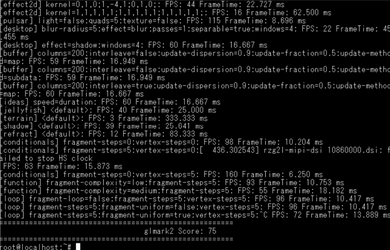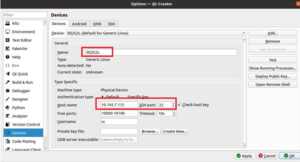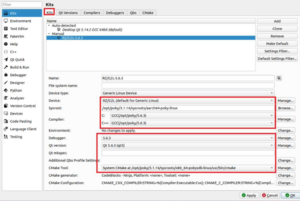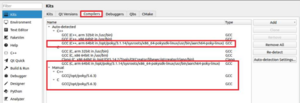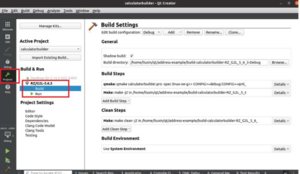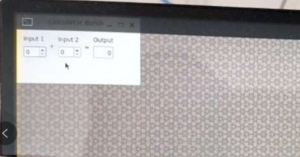RZ-G/RZ-G2 BSP Porting Ubuntu
← Back to RZ-G/RZ-G2_BSP_Porting
SoC: All
Specification
Target Ubuntu OS Version: 20.04, 18.04
Target reference board: RZ/G2L,/G2LC,/G2UL SMARC
Host PC Environment: Ubuntu20.04
Ubuntu Filesystem Building
Install QEMU
Run below command on Host Ubuntu PC
sudo apt-get install qemu-user-static
Download Required Files
| Select the package to download based on the desired file system |
wget https://cdimage.ubuntu.com/ubuntu-base/releases/20.04/release/ubuntu-base-20.04.4-base-arm64.tar.gz or wget https://cdimage.ubuntu.com/ubuntu-base/releases/focal/release/ubuntu-base-20.04.4-base-arm64.tar.gz
wget http://cdimage.ubuntu.com/ubuntubase/releases/18.04.5/release/ubuntu-base-18.04.5-basearm64.tar.gz |
Prepare Files
In the following example, please replace "version" as below name as you need
ubuntu-base-20.04.4-base-arm64: 20.04.4
ubuntu-base-18.04.5-base-arm64: 18.04.5
| Initial preparation |
| mkdir root
sudo tar -xpf ubuntu-base-<version>-base-arm64.tar.gz -C root sudo cp /usr/bin/qemu-aarch64-static ./root/usr/bin/ sudo cp -b /etc/resolv.conf root/etc/resolv.conf |
| Create a new script file |
vim ch-mount.sh
#!/bin/bash
function mnt() {
echo "MOUNTING"
sudo mount -t proc /proc ${2}proc
sudo mount -t sysfs /sys ${2}sys
sudo mount -o bind /dev ${2}dev
sudo chroot ${2}
}
function umnt() {
echo "UNMOUNTING"
sudo umount ${2}proc
sudo umount ${2}sys
sudo umount ${2}dev
}
if [ "$1" == "-m" ] && [ -n "$2" ] ;
then
mnt $1 $2
elif [ "$1" == "-u" ] && [ -n "$2" ];
then
umnt $1 $2
else
echo ""
echo "Either 1'st, 2'nd or both parameters were missing"
echo ""
echo "1'st parameter can be one of these: -m(mount) OR -u(umount)"
echo "2'nd parameter is the full path of rootfs directory(with trailing
'/')"
echo ""
echo "For example: ch-mount -m /media/sdcard/"
echo ""
echo 1st parameter : ${1}
echo 2nd parameter : ${2}
fi
|
Configure Filesystem
Enter Filesystem
chmod +x ch-mount.sh ./ch-mount.sh -m root/ chmod -R 777 /tmp
Install required software
apt-get update
apt-get install \ language-pack-en-base \ sudo \ ssh \ net-tools \ network-manager \ ethtool \ ifupdown \ isc-dhcp-client \ openssh-server \ iputils-ping \ rsyslog \ bash-completion \ htop \ resolvconf \ dialog \ vim
Add users
| Plesae replace the <name> with your user name |
| useradd -s '/bin/bash' -m -G adm,sudo <name>
passwd <name> passwd root chown -R root:root /bin/su chmod u+s /bin/su |
Configure UART
| vim /etc/init.d/ttyS0.conf |
| start on stopped rc or RUNLEVEL=[12345]
stop on RUNLEVEL [!12345] respawn exec /sbin/getty -L 115200 ttyLP0 vt102 |
Network setup
echo "auto eth0" > /etc/network/interfaces.d/eth0 echo "iface eth0 inet dhcp" >> /etc/network/interfaces.d/eth0 echo "nameserver 8.8.8.8" >> /etc/resolv.conf echo "nameserver 8.8.4.4" >> /etc/resolv.conf
Exit FileSystem
exit ./ch-mount.sh -u root/
packaged FileSystem
cd root tar -cjf rootfs.tar.bz2 ./*
Deploy FileSystem to SD Card
Prepare a SD card with ext4 partition: Learning/Linux#Partitioning and Formatting an SD Card
extract ubuntu .bz2 package to SD card
sudo tar -xvf rootfs.tar.gz -C /media/xxx/rootfs
Install Wayland, Wayland-Protocols and Weston
Environment Setup
| install required packages |
|
Compile and install Wayland
Copy the Wayland 1.18.0 source code from VLP Yocto build folder to SD card.
i.e. build/tmp/work/aarch64-poky-linux/wayland/1.18.0-r0/wayland-1.18.0/
| Enter the wayland-1.18.0 folder on SD card
Run below command on Reference Board |
|
Compile and install Wayland-protocol
Copy the wayland-protocol1.20.0 source code from VLP Yocto build folder to SD card.
i.e. build/tmp/work/aarch64-poky-linux/wayland-protocols/1.20-r0/wayland-protocols-1.20/
| Enter the wayland-protocols-1.20 folder on SD card
Run below command on Reference Board |
|
Compile and install Weston
Copy the weston8.0.0 source code from VLP Yocto build folder to SD card.
i.e. build/tmp/work/aarch64-poky-linux/weston/8.0.0-r0/weston-8.0.0/
| Enter the weston-8.0.0 folder on SD card
Run below command on Reference Board |
|
If the configuration is correct, it will display below messages
User defined options
libdir : /usr/lib/aarch64-linux-gnu
prefix : /usr
sysconfdir : /etc
backend-drm-screencast-vaapi : false
color-management-colord : false
remoting : false
xwayland : false
| compile and install |
|
Port GPU Libraries
Please refer to the StartupGuide.txt document in meta-rz-features/recipes-graphics/mali/files/mali_pkg_eval_vx.x.tar.gz
Migrate GPU drivers
Copy the driver mali_kbase..ko from VLP Yocto build folder to SD card.
i.e. build/tmp/work/smarc_rzg2l-poky-linux/kernel-modulemali/r35-p0/image/lib/modules/5.10.83-cip1-yocto-standard/extra
| install gpu .ko on reference board |
|
Migrate GPU Libraries
Copy the library files to SD card.
i.e. meta-rz-features/recipesgraphics/mali/files/mali_pkg_eval_vx.x.tar.gz
| install library to reference board |
/usr/lib/aarch64-linux-gnu/
|
Testing
Install testing tool
sudo apt install glmark2-es2-wayland
Start Weston desktop
Only root user can launch weston service, please switch to root user in advance
insmod mali_kbase.ko
export XDG_RUNTIME_DIR=/usr/lib/ export RUNLEVEL=3
weston --tty 1 &
Run glmark2 test
glmark2-es2-wayland --fullscreen
Port codec Librasries
In this section, we will copy codec related files from original VLP Yocto build.
i.e. core-image-qt-smarc-rzg2l.tar.bz2 or core-image-weston-smarc-rzg2l.tar.bz2
Pleaes copy this .bz2 file to Ubuntu SD card and run below instruction on reference board
unzip core-image-qt-smarc-rzg2l.tar.bz2 or core-image-weston-smarc-rzg2l.tar.bz2 to folder "yocto"
| copy codec drivers |
|
| copy gstreamer related lib |
|
| modify omx plugin configuration |
| vi /etc/xdg/gstomx.conf
replace "lib64" as "lib/aarch64-linux-gnu" [omxh264dec] type-name=GstOMXH264Dec core-name=/usr/lib/aarch64-linux-gnu/libomxr_core.so component-name=OMX.RENESAS.VIDEO.DECODER.H264 ····· [omxh264enc] type-name=GstOMXH264Enc core-name=/usr/lib/aarch64-linux-gnu/libomxr_core.so component-name=OMX.RENESAS.VIDEO.ENCODER.H264 ···· |
| install gstreamer dependency |
| apt install gstreamer1.0-libav gstreamer1.0-plugins-bad |
Test gstreamer
| login as root and insmod drivers |
| insmod /root/modules/mali_kbase.ko
insmod /root/modules/mmngr.ko insmod /root/modules/mmngrbuf.ko insmod /root/modules/uvcs_drv.ko insmod /root/modules/vspm.ko insmod /root/modules/vspm_if.ko |
| Specify gstreamer location |
| export GST_PLUGIN_SCANNER=/usr/lib/aarch64-linux-gnu/gstreamer-1.0/gst-plugin-scanner
export GST_PLUGIN_PATH=/usr/lib/aarch64-linux-gnu/gstreamer-1.0 |
| Launch weston |
| weston –tty 1 & |
| Play Video |
gst-launch-1.0 filesrc location=/root/video/sintel_trailer-720p.mp4 ! qtdemux ! queue ! h264parse ! omxh264dec ! waylandsink
gst-launch-1.0 filesrc location=/root/video/sintel_trailer-720p.mp4 ! qtdemux name=d d. ! queue ! h264parse ! omxh264dec ! waylandsink d. ! queue ! faad ! alsasink device=plughw:0,0 |
Port Qt
You can port Qt by following 3 methods
- Port from VLP
- Compile & Install Qt from source
- Install Qt by apt-get
Port from VLP
In this section, we will copy Qt5.6.3 related files from original VLP Yocto build.
i.e. core-image-qt-smarc-rzg2l.tar.bz2
Pleaes copy this .bz2 file to Ubuntu SD card and run below instruction on reference board
unzip core-image-qt-smarc-rzg2l.tar.bz2 to folder "yocto"
(For other version of Qt, you can modify Yocto meta-qt5\recipes-qt\qt5, please inqury Qt company for higher version QT integration)
| Port Qt lib |
| cd yocto
cp -rd usr/share/qt5 /usr/share/ cp -rd usr/lib64/qt5 /usr/lib/aarch64-linux-gnu/ cp -rd usr/lib64/libQt* /usr/lib/aarch64-linux-gnu/ cp -rd usr/lib64/pkgconfig/Qt* /usr/lib/aarch64-linuxgnu/pkgconfig/ export QT_QPA_PLATFORM=wayland export QT_PLUGIN_PATH=/usr/lib/aarch64-linux-gnu/qt5/plugins/ |
Start Weston RZ-G/RZ-G2 BSP Porting Ubuntu#Start Weston desktop
Then run the Qt example in /usr/share/qt5/examples
Compile from source
You can download qt5 source to reference board and compile on board.
Or cross compile qt5 on PC
Or compile qt5 in PC QEMU
Here we compile qt5 on board
| compile qt5 |
| download qt5 source code by git (ignore)
mkdir qt5-build cd qt5-build make make install (rsync to SD) |
We suggest to compile the qt5 with scrips
Notes: About the flags parameter in configure of Qt5. -qpa should be set as wayland or wayland-egl. We didn't support xcomposite-egl option
Install Qt by apt-get
apt-get install qt5-default qtwayland5
Notes: The above installation commands can only run part of Qt functions. If you need more functions, you need to continue installing Qt related packages.
Qt APPs development and testing
This section introduce how to develop Qt application on PC.
SDK build and installation
bitbake core-image-qt -c populate_sdk
The generated installation file is located at:
build/tmp/deploy/sdk/poky-glibc-x86_64-core-image-qtaarch64-smarc-rzg2l-toolchain-3.1.14.sh
Install this SDK to PC, default folder is /opt/poky/3.1.14
setup SDK runtime environment
source /opt/poky/3.1.14/environment-setup-aarch64-poky-linux
QT creator configuration
| Add Device | |
|---|---|
| Add new Kit | |
| Add Qt version | |
| Add compiler | |
| Add debuggers | |
| Select kit to build Qt project | |
| example to run qt calculator project |



